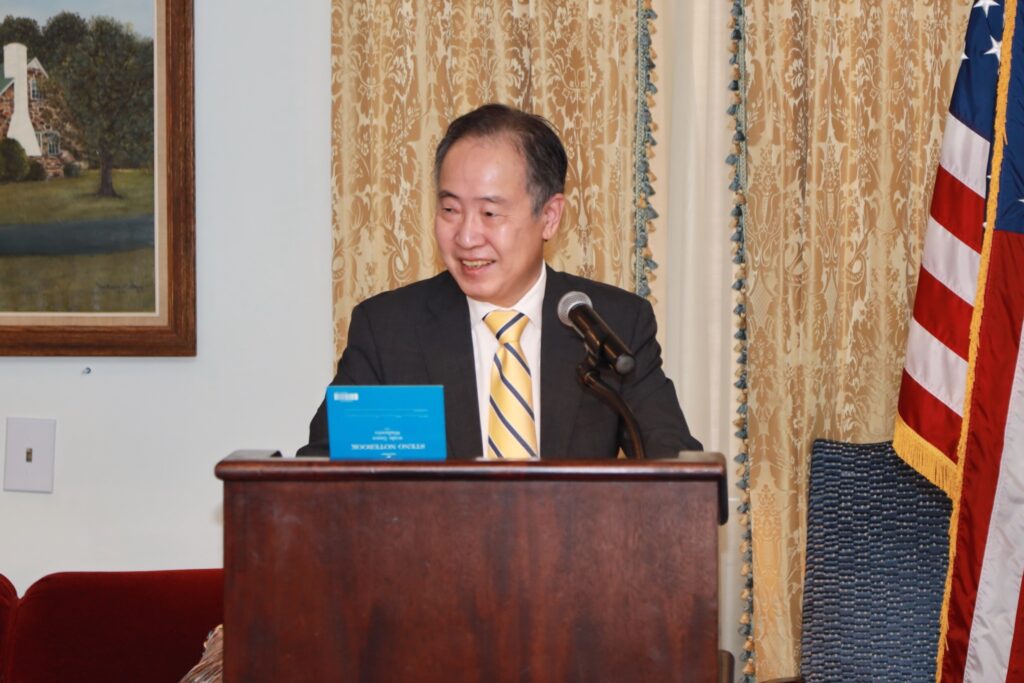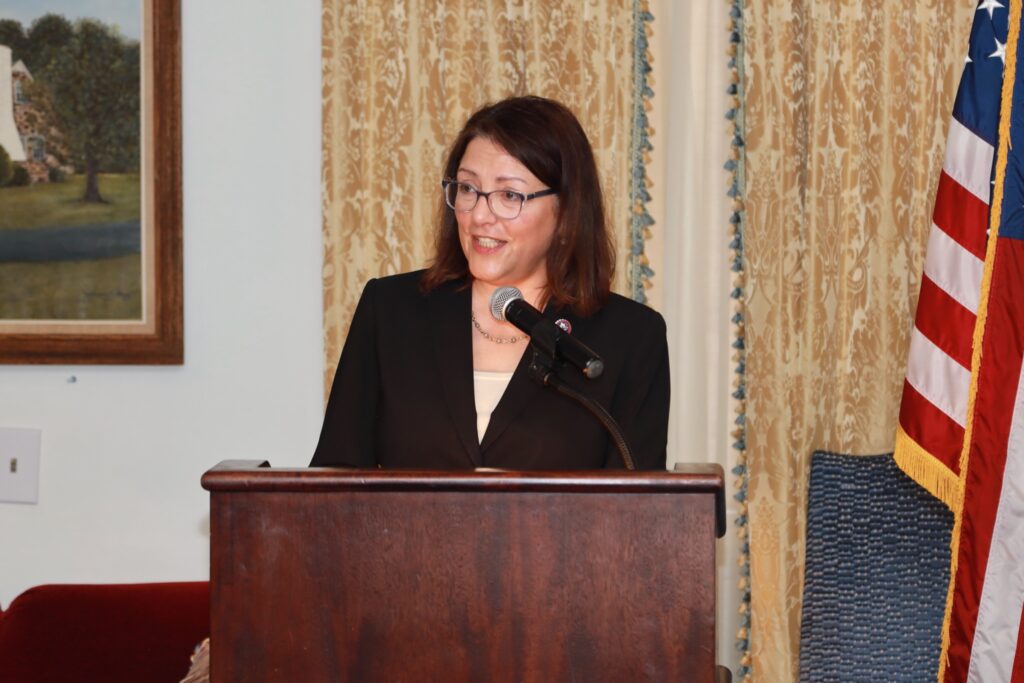
WASHINGTON, DC — Three leading voices on the American political and international stage appeared this past Thursday morning before a breakfast discussion of The Ripon Society and Franklin Center for Global Policy Exchange, delivering remarks not only about the importance of the U.S.-Japan alliance, but why strengthening this alliance will help promote peace and economic security in the Indo-Pacific region and elsewhere around the world.
The leaders were: veteran diplomat Tomita Koji, who was appointed Ambassador of Japan to the United States in January 2021 and has a career in the Japanese Ministry of Foreign Affairs that spans 40 years; Suzan DelBene, who represents the 1st District of Washington in the U.S. House of Representatives and serves as Vice Chair of the Ways & Means Committee; and, Adrian Smith, who represents the 3rd District of Nebraska in the U.S. House and serves as Ranking Member of the Ways & Means Subcommittee on Trade.
Ambassador Tomita opened the discussion by talking about President Biden’s recent visit to Japan, and why it was so important to Indo-Pacific affairs.

“I think the most important message of the visit is that the United States is staying focused on the Indo-Pacific region despite what’s happening in Ukraine,” the Ambassador stated. “This powerful message was reinforced by very substantive developments. I stayed on a few days after the visit to meet with Japanese business and political leaders, and there was unanimous agreement that the visit was an incredible success.”
“In terms of substance, exactly because of Ukraine I think it was incumbent for the two countries to demonstrate their resolve to strengthen our alliance. This effort has been helped by the fact that the visit coincided with the Prime Minister’s announcement of the start of a defense policy review, and this allowed him to express his commitment to substantially increase all the defense efforts. So this gave meat to what the two leaders were talking about — the importance of the alliance.”
The Ambassador also highlighted an economic security bill that was recently passed by the Japanese Parliament that is designed to protect technology and shore up supply chains, while at the same time also providing more effective oversight of Japanese firms working in sensitive sectors or in critical infrastructure. “This will allow Japan to play a more active role in terms of the supply chain challenge,” he said of the measure.
Ambassador Tomita concluded his remarks by discussing the importance of the Indo-Pacific Economic Framework, an effort that was announced by the President during his recent visit to Tokyo and is intended to not only deepen economic ties between the U.S., Japan, and 11 other countries in the Indo-Pacific region, but help further cooperation and agreement on some of the key challenges facing the region, such as building resilient supply chains battered by the pandemic. “This is a vehicle that will allow the U.S. to reassert its leadership in the economic development region,” he stated.
DelBene agreed, and opened her remarks by discussing why the U.S.-Japan relationship is important not just to both countries, but to her home state of Washington.

“The trade and economic relationship between the United States and Japan has really been a consistent driver of growth and prosperity for both our countries for many decades,” she stated. “Japan is an especially critical trade partner for my state. Over 40% of our jobs in our state are tied to trade. And our relationship in particular has historic roots. The first American vessel to reach Japan, aptly named Lady Washington, arrived carrying fur pelts from the Pacific Northwest for trade well over a hundred years before Washington became a state. And also, the first Japanese ship carrying freight into the United States came into the port of Seattle in 1896.
“Since then, Washington’s ports have been an important gateway to Japan and many other countries in Asia. Over the past decade, Japan has consistently been one of Washington State’s top three export markets and the top market for Washington’s agriculture and food exports. We are sending a lot of other products over outside of agriculture, as well. This includes being a major supplier of aircraft parts to build Boeing planes for Japan and the largest export market for Washington’s frozen french fries, which is valued at $250 million a year. If you are ever at a McDonald’s in Japan, chances are you’re eating french fries that were grown and processed in Washington State.”
“The trade and economic relationship between the United States and Japan has really been a consistent driver of growth and prosperity for both our countries.”
DelBene, who spent more than two decades as a successful technology entrepreneur and business leader prior to her election to Congress in 2012, also talked about the cultural significance of the U.S.-Japanese relationship to her home state, and why she is pleased the Biden Administration is moving to strengthen that relationship in the years ahead.
“The relationship between Japan and Washington isn’t just a commercial one,” she observed. “We are very closely tied in terms of our people, our history, and our culture. Today, more than 35,000 Japanese-Americans live in Washington, contributing to our state’s very rich culture. And of course, I haven’t even mentioned Ichiro. Between Washington and Japan, there are 35 sister city relationships. It’s critical that we continue to nurture and strengthen our economic, our strategic, and our cultural ties with Japan in the years to come to ensure that our shared values of freedom and democracy win out over authoritarianism and non-market trade abuses in the critical Indo-Pacific region.
“That’s why I’m pleased that the Biden Administration is returning U.S. leadership and economic engagement to the region through the launch of the Indo-Pacific Economic Framework, as the Ambassador talked about. While the Administration has stated that this framework will not be a traditional free trade agreement with tariff reductions, it has real potential to create more resilient supply chains, which are so necessary right now, raise labor standards, combat climate change, and open new markets for American farmers, ranchers, and fishers by removing non-tariff barriers to trade. It’ll be important for the Administration to consult with Congress also on a consistent and in-depth basis as these negotiations move forward.”
Smith echoed his colleague’s remarks.

“I certainly understand the importance of our partnership with Japan,” he stated. “And I can tell you that I’m committed to the success of this friendship and alliance. We’ve made great strides in building our relationship. I think it’s also important to say there’s still room to grow, and increasing market access for American agriculture exports to Japan was a major win for farmers and ranchers in my district.”
“Japan is also a significant partner in addressing national security. We have closely collaborated on a range of bilateral and multilateral coalitions. Whether it is the Quad or the Japan-U.S. alliance, growing this relationship would truly benefit the world by supporting strong regional cooperation to counter China’s influence.”
The Nebraska lawmaker, who serves as Co-Chair of the U.S.-Japan Congressional Caucus and is in the running to Chair the Ways & Means Committee if Republicans recapture the House this fall, also took a moment to talk about our nation’s trade policy in general, and why he believes — whether it is with Japan or with another country or region around the globe — the U.S. must remain forward-leaning and engaged with the world.
“I am a little bit concerned that trade in general has become more of a reactive scenario that we are engaging in rather than proactive,” he stated. “It’s been more than 10 years since we’ve sought the market access in any trade agreements. And I hope that we can move forward in a way that can bring more innovation here to our economy and engagements around the world, because the challenges are many. You know, trade is a very bipartisan issue. I think that that’s been proven over the last few years. And as we’ve come together, whether it’s on Columbia, South Korea, or USMCA, we’ve gotten some work done, and yet I really believe there are so many opportunities on the horizon.”
“When it comes to trade, we’re either moving or we’re standing still, and there’s more opportunity with movement. It’s better for consumers. It’s better for producers. It’s better for our commercial relationships and our geopolitical relationships around the world, as well.”
To view the remarks of Ambassador Tomita, Rep. DelBene, and Rep. Smith before the breakfast discussion this past Thursday morning, please click on the link below:
The Ripon Society is a public policy organization that was founded in 1962 and takes its name from the town where the Republican Party was born in 1854 – Ripon, Wisconsin. One of the main goals of The Ripon Society is to promote the ideas and principles that have made America great and contributed to the GOP’s success. These ideas include keeping our nation secure, keeping taxes low and having a federal government that is smaller, smarter and more accountable to the people.



